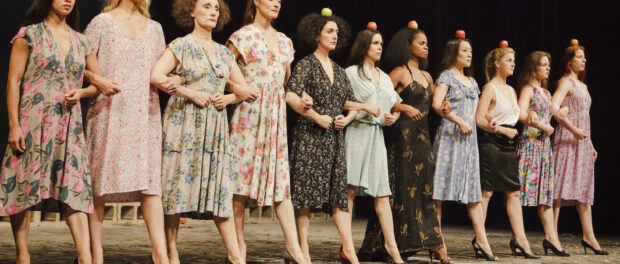Tanztheater Wuppertal gives us a (terrifying) taste of Sicily in Pina Bausch’s Palermo Palermo
Pina Bausch’s 1989 masterpiece Palermo Palermo is a Felliniesque portrait of life in the Sicilian city. Like Fellini’s films (Roma comes to mind), Bausch’s work is less focused on constructing a concrete narrative, and more concerned with revealing the ineffable fucked-upness of life, the unspoken and unspeakable cruelty and weirdness and the bits of fleeting beauty to be found amongst the rubble.
Tanztheater Wuppertal, including longstanding members of the company, held the audience at Salle Wilfrid-Pelletier in thrall for close to three hours as it enacted the street-scene vignettes of Bausch’s original vision, which just pre-dated the fall of the Berlin wall. True to the company’s name, the work is as much theatre as dance, if not more.
Act I begins, literally, in rubble. The curtains go up on a floor-to-ceiling medieval wall. Within seconds, the wall collapses, concrete breezeblocks falling to the ground, dust billowing. The entire work takes place in front of, on top of, and around the debris, giving the feeling that all of life grows out of the wreckage of the past, that there’s only so much we can do when our roots are so deep in decay. This symbolism is enhanced throughout the work, as various characters attempt to clean up the garbage that gradually accumulates on the stage. Sweeping it all away just seems futile; when one character uses her long hair as a broom, the futility becomes all the more apparent.
The wreckage extends from the physical to the emotional. The opening scene features a woman asking to have her hand held, to be kissed, to be hugged: every attempt of the two men she calls on is met with rejection and even more strident demands: “No, I said hold my hand/kiss me/hold me!” They try, but she can’t accept their efforts. Her neediness is matched by her inability to accept having her needs met. Things take a turn to the masochistic when she screams for the men to throw tomatoes at her. They oblige, but no matter how many tomatoes they throw, she wants more, eventually demanding that they aim at her face. This raw, disturbing neediness—the id in all its glory—permeates the work.
But it’s not just the neediness of the id. It’s the id corrupted, distorted, twisted, turned gargantuan by the sheer virtue of being alive in the world. One character, a cross-dresser who permanently inhabits one corner of the stage, sometimes watching shows about sharks in German on a black and white TV, appears in one scene to slice pieces of flesh off his forearm with a knife, cook them on a hot clothing iron, and proceed to eat them. Another dispassionately dabs water and then sugar on her lips, then asks someone to kiss her. Another kicks a man repeatedly, each kick causing him to offer up packages of deli meats and sausages hidden in his clothing. The work is not without humour.
A recurring theme involves the setting of a round European café table with a glass of water or wine. What would normally be seen as quaint, as a symbol of old Europe and its traditions, becomes something transient, ephemeral, insubstantial a tourist brochure gone horribly awry. In one such scene the cross-dresser shoots—with a gun—a few tomatoes; in another, a plate of food and a glass is set on the rubble, and is eaten by a live dog (leading me to wonder whether the dog travels with the company, or if local dogs are hired in each city).
The music also gets across the themes of need and the ephemeral. The opening song is Lil Green’s 1941 recording of Why Don’t You Do Right, whose refrain “Why don’t you do right, like some other men do/get out of here and get me some money too” provides the perfect counterpoint to the woman asking and pushing away at the same time, speaking to the sense of longing and disappointment that underlies much of the rest of the work. Much of the soundtrack is an ongoing electronic pulse built on the tolling of church bells, which foreshadows the last scene, in which a man tells a fable about some geese asking the fox if they can each say one last prayer before he eats them. “They’re still praying today,” are the last words spoken. The inhabitants of Bausch’s Palermo, much like all of us, are all fending off death in the best way they know how.
Tanztheater Wupperthal performed Pina Bausch’s Palermo Palermo at the Salle Wilfrid-Pelletier February 23, 24, and 25.






